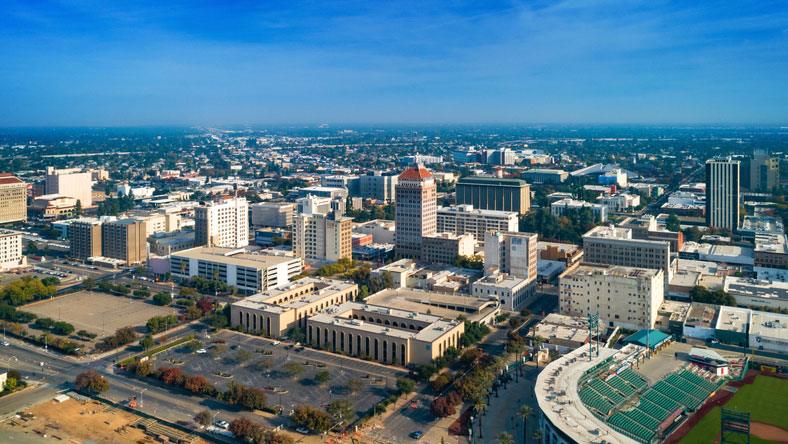Written by Helen Lewis

Are you considering becoming a Doctor of Nursing Practice (DNP) in Fresno, California?
In the following article, we explore the options available to aspiring DNPs in the Golden State, touching on both local and online DNP degree programs, as well as what you can expect as a salary after graduation.
Welcome to Fresno, California
Fresno, located in the heart of California’s Central Valley, is home to significant educational institutions like California State University, Fresno, and Fresno Pacific University.
Established as a station on the Central Pacific Railroad in 1872, Fresno got its name from the Spanish word for “ash tree,” which reflects its scenic natural surroundings, just two hours away from Yosemite National Park.
Learn the Landscape: Fresno’s Healthcare Industry
Some of the biggest players in Fresno’s healthcare scene include Community Medical Centers, Saint Agnes Medical Center, and Kaiser Permanente.
These facilities provide a range of services, from primary care to specialized treatments, and are crucial not only for Fresno residents, but for the entire surrounding area. Community Regional Medical Center, for example, is the only Level 1 trauma center in the Central Valley, making it a critical resource for the most severe medical emergencies.
Community Regional Medical Center
Community Regional Medical Center (CRMC) in Fresno, California, is the flagship hospital of Community Medical Centers, a health system that serves the Central Valley region.
CRMC is the largest and most comprehensive hospital in the area. Today, CRMC has the only Level 1 trauma center between Los Angeles and Sacramento, meaning that it is the comprehensive regional resource responsible for providing the highest level of surgical care to trauma patients.
Community Regional Medical Center also houses the Leon S. Peters Burn Center, one of the most highly regarded burn treatment centers in California. The facility also serves as a teaching hospital affiliated with the University of California, San Francisco (UCSF) School of Medicine, meaning that medical students, residents, and fellows – possibly including aspiring nurses pursuing DNP degrees – can get their on-the-job training within this hospital.
Are There DNP Programs in Fresno, California?
Yes, there are two main Doctor of Nursing Practice (DNP) programs available to nurses seeking this advanced degree in Fresno, California: California State University, Fresno and National University, Fresno Campus. Both of these options will be explored more in detail below.
Fresno State University

Overview:
- Online or in-person: Primarily online with some in-person components. Students are required to attend one intensive session on campus each semester.
- Program Length: The program is designed to be completed in two years of full-time study and consists of 37 doctoral units.
- Tuition: N/A
- Scholarships: Scholarships and financial aid options are available.
- Degrees Offered in Nursing: Bachelor of Science in Nursing (BSN); RN to BSN Program; Master of Science in Nursing (MSN); Doctor of Nursing Practice (DNP)
The DNP program at Fresno State is primarily an online program, which allows students to balance their professional work with academic commitments.
However, it does include some on-campus intensives. Students are required to attend these intensives at the beginning of the first and fourth semesters, with the remaining sessions conducted online. This blend of online and in-person learning ensures that students receive both the convenience of remote education and the invaluable experience of face-to-face interaction and hands-on training.
The program curriculum is designed to be completed in five semesters, or approximately 21 months of full-time study. Key areas of study include advanced clinical practice, healthcare policy, leadership, and evidence-based practice.
Students will also undertake a culminating doctoral project, often called a capstone, that addresses a significant issue in professional practice or policy, contributing to improvements in healthcare outcomes. This project often allows students to apply their learning directly to their employment settings, making the research both practical and impactful.
Prospective students must meet several admission requirements to be considered for the DNP program. Applicants need to have a master’s degree in nursing or a related health field, along with a current, unrestricted California RN license. Additionally, they should have a cumulative GPA of at least 3.0 and national certification in a nursing specialty.
Importantly, Fresno State’s DNP program is designed for those who already have significant experience in advanced practice nursing, administration, or nursing education.
Throughout the program, students will engage in both synchronous and asynchronous learning activities via platforms like Zoom and Canvas. This flexible approach caters to working professionals, allowing them to continue full-time employment while completing their degree. The program’s structure includes 1,000 clinical hours, ensuring that students gain extensive hands-on experience.
The DNP at Fresno State is accredited by the Commission on Collegiate Nursing Education (CCNE) and the Western Association of Schools and Colleges (WASC), underscoring its commitment to high educational standards and excellence in nursing education.
National University

Overview:
- Online or in-person: The DNAP program is a hybrid format, combining online coursework with on-site didactic sessions and clinical residencies. The first 15 months are focused on on-campus didactic learning in Fresno, followed by a 21-month clinical residency.
- Tuition: Around $116,235, which includes tuition and fees.
- Scholarships: National University offers various financial aid options, including scholarships. Students are encouraged to check with the university’s financial aid office for specific opportunities available to them.
- Degrees Offered in Nursing: Doctor of Nurse Anesthesia Practice (DNAP)
One notable alternative to Fresno State’s DNP Program is at National University, which offers a specialized DNP program as a Doctor of Nurse Anesthesia Practice (DNAP). This program is specially tailored for those aiming to become Certified Registered Nurse Anesthetists (CRNAs), a highly specialized and in-demand field.
The DNAP program at National University is a hybrid program that spans 36 months, combining both online coursework and in-person learning. The first 15 months are focused on academic instruction, followed by a 21-month clinical residency, where you get to apply your knowledge in real-world settings under the supervision of experienced CRNAs and anesthesiologists.
This program’s most unique feature is its comprehensive approach. From mastering advanced pharmacology to understanding complex human anatomy and physiology, you’ll be thoroughly prepared to handle the responsibilities of a CRNA. Plus, the hybrid nature of the program offers some flexibility, which is great if you’re balancing other life commitments while pursuing your education.
DNAP vs. DNP: Why Choose to Become a DNAP?

Choosing between a Doctor of Nursing Practice (DNP) and a Doctor of Nurse
Anesthesia Practice (DNAP) depends on your career goals and interests, as both offer distinct benefits. While DNP is a catch-all term for Doctors of Nursing Practice, DNAP is the title of a type of specialization, or a focus area, for qualified DNPs.
DNAPs have highly specialized skills in anesthesia care, a critical and often in-demand area in the medical field.
In addition to becoming a competitive applicant for potential jobs, Certified Registered Nurse Anesthetists (CNRAs) typically earn higher salaries compared to many other advanced practice nursing roles.
According to the Bureau of Labor Statistics, CRNAs are among the highest-paid nurses, with average salaries often exceeding $180,000 annually.
The DNAP’s focus on anesthesia care directly aligns with these high-paying roles, offering strong financial incentives.
Additionally, while DNPs can use their skills in roles outside of medical settings, like
universities and in public policy, DNAPs are heavily oriented towards hands-on clinical practice. This is ideal if you prefer a career that’s deeply embedded in patient care rather than administrative or educational roles, which might be more common with a traditional DNP.
Non-DNP Nursing Programs in Fresno
Fresno Pacific University

Overview:
- Online or in-person: Both.
- Tuition: N/A
- Scholarships: Fresno Pacific University offers scholarships and financial aid options for nursing students.
- Degrees Offered: Bachelor of Science in Nursing (BSN), RN to BSN, and Master of Science in Nursing (MSN).
Fresno Pacific University also provides robust nursing programs, although it does not offer a DNP.
Instead, this religious university offers a Bachelor of Science in Nursing (BSN) and a Master of Science in Nursing (MSN).
Like Fresno State University, Fresno Pacific University offers a BSN program, a prerequisite for any aspiring DNP. That means that students who would eventually like to pursue a DNP degree could theoretically complete their BSN at Fresno Pacific University, before completing their DNP work at another institution.
Fresno Pacific University also offers a Master of Science in Nursing (MSN), a specialized track that allows nurses to focus on areas such as healthcare leadership, nursing education, or advanced clinical practice.
Why Pursue an MSN?
A Master of Science in Nursing (MSN) offers several advantages, particularly for those who are looking to advance their careers more quickly.
An MSN typically takes about 2 to 3 years to complete, which is shorter than the time required for a Doctor of Nursing Practice (DNP). This allows nurses to move into advanced practice roles, such as Nurse Practitioner, Clinical Nurse Specialist, or Nurse Educator, sooner.
Additionally, MSN programs often provide opportunities to specialize in specific areas of nursing, enabling nurses to focus on the areas that best match their career goals and interests.
Choosing an MSN can also be more cost-effective and less time-consuming than committing to a DNP program.
For many nurses, an MSN provides the necessary credentials to advance their careers without the need for the extended duration and higher cost associated with a doctoral program. Moreover, an MSN is sufficient for many advanced practice roles, making it a practical choice for those who want to enhance their expertise and career prospects without pursuing a terminal degree.

DNP Salaries and The Cost of Living in Fresno, California
On average, DNP-educated nurses in Fresno can expect to earn an annual salary of approximately $151,700, which translates to about $72.93 per hour. This figure places Fresno’s nurse practitioner salaries slightly above the state average, reflecting the high demand for advanced practice nurses in the region.
The overall job outlook for DNPs remains positive, with increasing opportunities in various specialties, including psychiatric and women’s health nurse practitioners, who can earn upwards of $165,410 annually in California.
Fresno has a relatively moderate cost of living – particularly when it comes to housing – when compared to other major California cities like San Francisco or Los Angeles.
2023 US Bureau of Labor Statistics salary and employment figures for Social Workers reflect state data, not school-specific information. Conditions in your area may vary. Data accessed August 2024.
